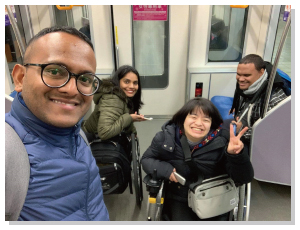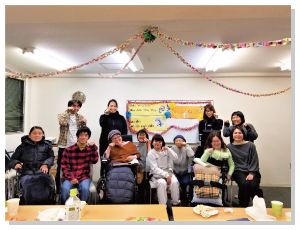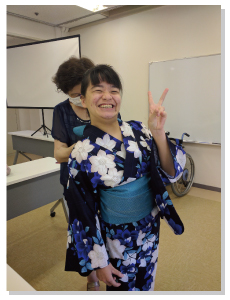Final Report
Hieu's Final Report
THE JOURNEY THAT FOREVER CHANGED MY LIFE
In September 2019, I came to Japan, thrilled with the prospect of life in a developed country with accessible infrastructures and a totally different culture from my country, Vietnam. But this trip turned out to be a life-changing experience far beyond my imagination, full of surprises and unexpected moments. My journey in Japan as a Duskin leadership trainee was a journey of finding the goal for my life and the better version of myself I wanted to become. In 2020, the corona pandemic hit the world; as a result, I was not able to fly home as planned. I ended up becoming the trainee who stayed in Japan for the longest training in 21 years. This report is a brief story of how the experience has changed me since I came to Japan.
The training for the four of us, Anju, Ari, Awwam and myself, started off with a three-month Japanese course. The Japanese class navigated me to a journey of not only new culture but new methods of communication. I learned how Japanese people communicate politely, react to other’s stories. I also learned many new expressions. It made me more confident about talking to people.

We also had many group training sessions on Japanese social service systems for people with disabilities (PWDs), as well as soft skills required of a leader. I learned a lot and was able to compare Japan’s situation with that of Vietnam. One of the things I remember most from the group training was Dream Map. As we drew our dream map we answered questions about who we want to become in the future. Since I had been working so hard, but never thought of myself in the future, thanks to this session, I was able to draw a roadmap for my life and the image of a leader that I wanted to become. Dream Map was an excellent tool that I would love to use to help my friends train in Vietnam.
When my individual training started, my independent- living experience also started. During the 2020 New Year holiday, I went to stay at the home of Ms. Masako Ishii. She worked for Center for Independent Living "Ring-Ring", Kobe. With homestay experience, I was able to put my Japanese skills to practice for the first time. At first, even though I was not able to understand anything, Ms. Ishii’s mother kept talking to me in her Osaka dialect (“Osaka-ben”). I kept smiling, pretending to get what she was saying. After a few days, I got used to staying at their house, and the mother’s Osaka dialect, and life got easier. Besides hanging out with Ring Ring CIL members, I had many first-time experiences. For example, I wore a kimono, made takoyaki (savoury dumplings with octopus in them), and enjoyed Arima Onsen (a hot spring). The stay was only for ten days, but I was able to get in touch with Japanese culture.

During the individual training, I visited two social welfare corporations. The first one, in Tanohata Village, Iwate Prefecture, was a corporation called “Hack no Ie (Hack's House)”. Hack's House supports people and children with intellectual disabilities. I met a lot of children and observed how the staff worked with them. The second place I visited was in Fukushima Prefecture, called “Kokoron”, an agricultural welfare facility. I learned about running an agricultural business and working with people with mental illnesses.
After that, I had chance to learn about Japan’s centers for independent living by visiting and staying at different centers.
The first two centers were “Ring-Ring” in Kobe and “the Human Care Association” in Hachioji, Tokyo. Here I learned the philosophy of independent living and practiced peer counselling. I had heard about independent living many years before but this was the first time I met people who were putting the concept to practice, so I really enjoyed the experience. They showed me how independent living had started in Japan and how CILs currently function.
Next, I went to Mainstream Association. Due to the pandemic, the one-month training schedule was extended to three months, which gave me more chance to learn about the independent living concept and life of people who use CIL’s services to live in the community and not in social protection centers. To my amazement, I was welcomed by 100 mainstream’s members waiting for me at Nishinomiya Station when I arrived. I felt as if I was a famous singer or something and my fan were waiting for me! By staying with Mainstream members, I understood the power of peers. To run an independent living center, we need peers and there must be a ‘shared value’ among the members. I really appreciate how Mainstream members taught me this in practice, without any documents or books. I learned by observing and listening.
Before returning to Tokyo, I went to Independent Living ”MUCHU” Center and Center for Independent Living ”Partner” in Osaka. I enjoyed making more new friends.
From the ten-month training, I learned about important things that help people with disabilities to live independently in the community, including but not limited to barrier-free society, empowerment and fellow support, assistance service, and employment support for persons with disabilities.
The first thing I noticed when I arrived in Japan was the barrier-free environment in big cities. I was able to go almost anywhere I wanted by train or bus, alone, and all public buildings were so accessible. I know that this is one of the results of independent living movement that PWDs pioneers had advocated for, so I always feel grateful every time I go on the train. The feeling of freedom, of being able to move around independently in wheelchair is so meaningful to me, because it encourages me to advocate for an accessible Vietnam. Of course, it will take time, but I will not give up.
At Human Care Association and Ring-Ring, I experienced peer-counselling. It was extremely challenging to do peer counselling in Japanese. Sometimes I was not able to understand everything but peer counselling really empowered me to love myself and my disability. ‘Loving oneself’ is an important attitude that everyone needs, especially PWDs. I would love to share this with my many friends in Vietnam, because accepting ourselves can take us to the next level in life and help us find a way to live a better life.
One of the important points of independent living concept is that PWDs can make their own decision and be responsible for it. I did not understand this until I met new friends at Mainstream Association who were using personal assistance (PA) services. For example, when cooking, the PA only follows the PWD’s instructions, and if the food is not good, it is not the PA’s fault, it is the PWD’s responsibility, because he/she decided how to cook. This really opened my eyes because PA is totally different from caregiver, an amazing job that helps PDWs to live with dignity and not be considered as a burden on their family. And it is great that government pays independent living centers to coordinate this service for users. If PDWs do not have to try their best to do everything themselves, they are left with more time and energy to do what they like, including getting married. This is so meaningful to me. When I was in Vietnam, everyone told me to do my best to walk, but in Japan, using the electric wheelchair saved me a lot of time and energy to follow my hobby-photography. In short, I realized that independent living does not mean doing everything oneself but receiving enough support and reasonable accommodation to be able to make one’s own decision and be responsible for it. The best moment that constantly reminds me of the beauty of independent living is the moment when I laughed with Mainstream’s CP group in Suma Aqualife Park Kobe. It reminds me that no matter who we are, or what disability we have, we all deserve the freedom of making our own choice in life.
With the pandemic, while waiting for a flight to go home, the four of us were fortunately able to attend Disability Equality Training. It was a meaningful session on how we can share new approaches with others, including on definitions of disability, and what we can do to change society.
After the training, the other three trainees went home except me, so I decided to spend time improving myself with various soft-skill training and interesting experiments. A photography training was kindly arranged for me. I had never thought of using a camera to take photos like professional photographers, but after I started using a Nikon camera, I fell in love with the feeling of observing things through the lens. I also made new friends through photography, with whom I exchanged our mutual points of view. When I go home, I will use these skills to advertise positive images of people with disabilities.
I have also joined various art and entertainment activities such as going to art museums, going to a painting class, making pottery, watching movies, and going to a pet cafe. One time, I went to watch football as well. Through those activities, I gained not only new knowledge but how these services were designed for wheelchair users. I really learned a lot from the Accessible Stadium lesson by Mr. Sato from DPI-Japan.
I also had a chance to revisit Hachioji again to experience activities by social welfare corporations. I met people with different types of disabilities working together. It was such a great learning experience. So great that I wrote a report and shared it with my friends in Vietnam. These friends and I then discussed how to set up a job training center in Vietnam, based on the Japanese model.
Since I was the only trainee left, I had some experiences with JSRPD’s staff that former trainees had not experienced, such as being a model for a magazine, visiting a guide dog association, and meeting people who are in the beauty industry. These ‘first time’ experiences were very meaningful to me, as I saw there was a far broader approach for people with disabilities in Japan, and how they are trying to create an inclusive society where everyone can enjoy equal rights.
As healthy life is important, I also visit a rehabilitation clinic and use massage services of Shinjuku Welfare Center for Persons with Disabilities. I also experienced some sports like electric wheelchair football and universal sport sessions by Asian Development with the Disabled Persons (ADDP). These games made me feel more confident and made life more enjoyable. I really want to share these experiences with people in Vietnam’s cerebral palsy group.
I never expected to have one more New Year in Japan but it was so lovely to be with Morigami family at “Lifequality Casa”, the hotel they run in Kiyosato. We went to see fireworks together, went star gazing (though there was too much snow for the stars) and enjoyed a lot of good food together. They became my family at this most important time of the year.
What I wrote above is not everything I have been doing this year. There is one more thing that happened, that I will never forget for the rest of my life; the ‘lost and found’ service in Japan. I lost my wallet right after the new year. I went to report at a police box with JSRPD’s staff. I never hoped to find it again, but it was found it in less than 3 hours. I might have been just lucky but going to the police station and talking with the policemen were not something I could have imagined for this journey. And I will never forget how friendly the Japanese policemen were. As I write these words, I realize how much I love Japan. It will be so hard to leave.
However, I need to go home and contribute to the disability community and independent living movement. I believe that whatever I decide to do, I will have a big Japanese family and friends behind me who will support me and my journey ahead.
I sincerely thank Duskin Ainowa Foundation for having supported me all the way to complete this training as well as overcome the hard time of being unable to go home. This journey also would never have become as meaningful as it is without the arrangement and encouragement from the staff of Japanese Society for Rehabilitation of Persons with Disabilities. Also, without the guidance and support from Mainstream Association, Human Care Association, and Center for Independent Living “Ring-Ring”, I would never have understood the independent living concept and how it changed society. In the pandemic, I received so much care from many friends. It was a huge encouragement that helped me overcome the hardship of being ‘the only trainee’. Being Duskin’s trainee is the best honour that happened in my life. The knowledge, the memories and the love I received from this experience will be my wings to fly with my dream of bringing better life for people with disabilities in Vietnam.





